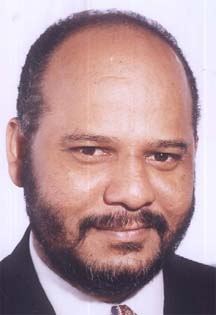The 41 Mormons who were deported in September 2009 were removed at the behest of the Minister of Home Affairs, Clement Rohee who could not be reached by President Bharrat Jagdeo during a meeting with the missionaries, and the US embassy was appalled that court orders issued in the matter were not being adhered to, according to cables released by WikiLeaks.
In a September 3 cable, then Charge d’Affaires Karen Williams said that the missionaries had said that the police had told them that they were being removed because they were gathering information for the US. An arbitrary limit of 20 was also placed on the number of Mormon missionaries who could be in the country at any one time.
Williams said that despite never formally charging the group with any offence, the Ministry of Home Affairs held the missionaries in the CID’s lobby, took their passports, and “failed to provide them with basic necessities such as water, food, and toilet paper.”

Williams said that the Mormon Church had supported missionaries in Guyana for more than 20 years and at that point had more than 60 missionaries working in the country on six-month rotations. The church, she said, also reputedly spent US$1M annually in Guyana.
According to Williams she raised the deportations in a previously scheduled meeting with President Jagdeo.
“The President, who was visibly surprised by the news that the Ministry decided to expel the missionaries—and acutely aware of the negative media attention it would bring—immediately tried to reach the Minister of Home Affairs, who was unavailable, for an explanation. An hour later missionary leaders met with the President who agreed to release them provided they left the country within 30 days,“ she said.
She said that though the impetus for the denial of the work permits and the decision to remove them was unclear, the acting head of the CID unit was blunt about the government’s intent: The Minister wanted them out.
“The missionaries told the Embassy that the police initially said they were detained for gathering information on behalf of the U.S., though the GoG denied it and stated the rumor originated with the U.S. Embassy. The missionary leaders who met with the president said he noted the GoG had received an increase in missionary applications from Muslim groups and implied there was a limit on how many missionaries any one group may have in Guyana, though he could not, or would not, name that number or produce any statutory information on category limitations.“

Two diplomatic notes, Williams said, were sent to the government protesting the detentions and asking for the procedures for filing for work permits and if there were any numerical caps.
In her comment on the developments, Williams felt it signalled a weakening of Jagdeo in his party and a resurgence of the old guard following the death of former President Janet Jagan in March of 2009.
“The expulsion comes as a surprise given the Church’s uneventful history in Guyana and the country’s long tradition of free religious expression. Aside from the poor treatment and unjust detention of AMCITs, this episode is deeply disturbing on several levels. The fact that president was clearly caught off-guard at the news that the Ministry planned to expel a large group from a major religious organization and then was unable to reach the Minister of Home Affairs immediately suggests that Jagdeo’s position in the party has indeed weakened. The March 2009 death of Guyana’s former President and staunch supporter … has provided an opening for the old-guard communist element in the ruling party to assert itself prior to the 2011 elections,“ Williams relayed to Washington.
She added that Jagdeo appeared not to have the support within the PPP to reshuffle the cabinet or remove incompetent or corrupt officials. “That the Ministry of Home Affairs did not even acknowledge that a court order existed for the release of the missionaries and it took an intervention from President Jagdeo himself for them to be released brings into serious question the GoG’s commitment to, or ability to enforce, the rule of law.“
In a second cable on October 28, 2009, Williams said that the arbitrary treatment of the Mormons had continued and that there was no response from the Home Affairs Ministry on queries about work permits.
“As of October 1, all Mormon missionaries temporarily detained in early September and ordered to depart Guyana within 30 days had done so. Some replacement missionaries are beginning to arrive.
“LDS representatives have met with Ministry of Home Affairs, officials, who presented the Mormons with guidelines to follow so similar incidents do not recur… these guidelines stipulate that LDS missionaries must obtain work permits prior to entering Guyana and no more than 20 foreign personnel may hold such permits at one time. No statutory bases for the new procedure or the numerical limitation appear to exist in Guyana law. Post’s repeated requests to the Ministry of Foreign Affairs for clarification of the work permit procedures have gone unanswered,” Williams related.



